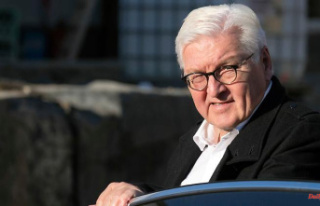Many leaders have traveled to Ukraine to express their solidarity with the country since the Russian war of aggression. Chancellor Scholz was not among them. A trip to Kyiv is planned for June - even if Berlin hasn't confirmed it yet.
According to a media report, Chancellor Olaf Scholz wants to travel to Kyiv before the G7 summit at the end of June. He is planning the visit with French President Emmanuel Macron and Italian Prime Minister Mario Draghi, reported "Bild am Sonntag", citing French and Ukrainian government circles. The "Spiegel" confirmed the travel plans with reference to "government circles". A spokesman for the federal government told ntv in the evening that this could not be confirmed. Macron's Elyseé Palace in Paris said: "No, we do not confirm this information."
Since the beginning of the war, numerous heads of state and government have traveled to Kyiv to demonstrate their solidarity with the country attacked by Russia. Scholz had recently said that he would only travel there if there were specific things to discuss. Ukraine is hoping the EU will declare it a candidate country at its summit on June 23-24, just ahead of the June 26-28 G7 summit. The EU Commission intends to make its recommendation on this next week. That's why Commission chief Ursula von der Leyen traveled to Kyiv at the weekend for the second time since the beginning of the war. There she met the Ukrainian President Volodymyr Zelenskyy.
From the Élysée Palace it was said on Friday that Macron was available for a visit to Ukraine, but there were no concrete travel plans and dates yet. Such a trip could take place before, but also after the EU summit. There was no talk of a joint visit with Scholz or Draghi. The purpose of a trip by Macron will be to open or initiate a European perspective for Ukraine, it said.
Selenskyj invited Scholz to Kyiv weeks ago. At first, however, there was resentment because of the short-term cancellation of a trip by Federal President Frank-Walter Steinmeier from the Ukrainian side. After the irritations had been cleared up, Scholz pointed out that such a trip is not about symbols, but about content: "I will not join a group of people who do something for a short in and out with a photo shoot . But if, then it's always about very concrete things."
A number of his ministers have since been to Ukraine: Foreign Minister Annalena Baerbock, Development Minister Svenja Schulze and most recently Health Minister Karl Lauterbach and Agriculture Minister Cem Özdemir. Parliament Speaker Bärbel Bas and opposition leader Friedrich Merz also visited Kyiv.
Instead, Scholz toured five Balkan countries on Friday and Saturday. This trip also dealt with the topic of EU accession. Nineteen years ago, six countries in the Western Balkans were promised admission to the European Union. Not a single one of them is close to joining today. Two do not even have the candidate status that Ukraine is now hoping for. At his last stop in Sofia, Scholz commented positively on the recent trips to Kyiv by the Leyens, Lauterbachs and Özdemirs. "I welcome all these trips," he said. They are not surprising to him and all make sense. That is also the standard for such trips. When asked if and when he would travel to Ukraine himself, the chancellor did not answer.
Trips by top politicians to conflict or even war zones are usually not announced for security reasons. But there are also exceptions: Scholz announced the Baerbock trip in advance without giving an exact date. Von der Leyen also announced her first trip to Kyiv without giving any details.












